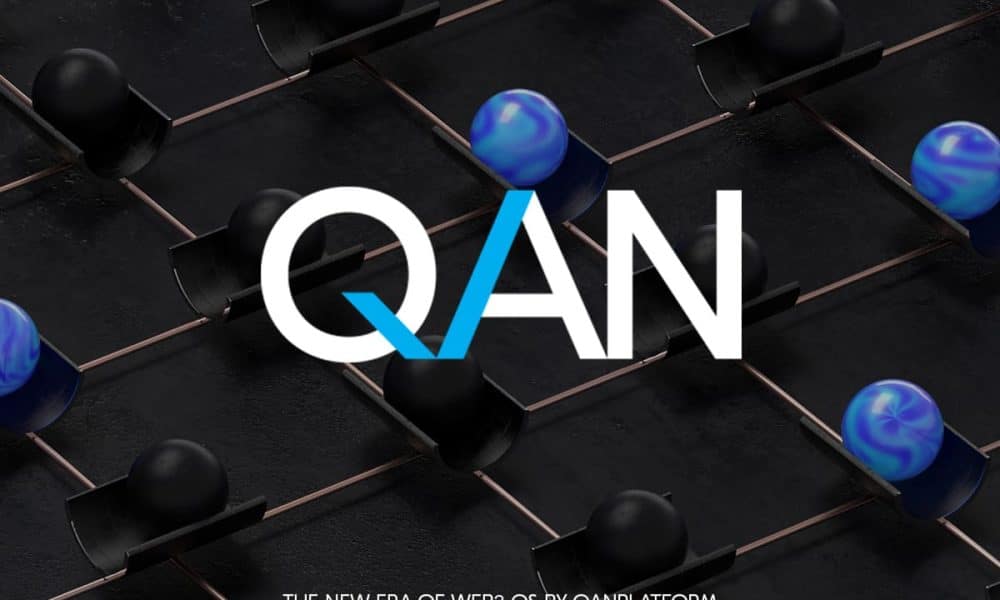Press Release
QANplatform launches the Quantum-Resistant Private Blockchain

QANplatform has unveiled the world’s first private blockchain that is both quantum-resistant and compatible with Ethereum’s EVM, while also enabling developers to code smart contracts in any programming language.
The NIST-recommended primary post-quantum algorithm has been foreseen and integrated into the quantum-resistant QAN Private Blockchain. This integration enhances the security of blockchain solutions built on the platform, rendering them resilient against potential attacks from quantum computers.
Thanks to QANplatform’s multi-language smart contracts, over 26 million new software developers are able to enter the Web3 space, which can reshape and boost the blockchain industry.
QANplatform is developing a hybrid blockchain. The launch of the QAN Private Blockchain marks the first step, followed by the Public TestNet this autumn and the QAN Public Blockchain’s expected release by late 2023.
QANplatform ushers a new era of Web3 OS (Operating System) with the launch of the world’s first private blockchain that is both quantum-resistant and compatible with Ethereum’s EVM, while enabling developers to code smart contracts in any programming language.
A blockchain platform, like Ethereum or QANplatform, is the basic infrastructure of all blockchain projects and applications. It is comparable to the operating system of a computer. It is the fundamental base layer on top of which the ecosystem can build endless solutions. Blockchain is a top digital transformation trend. However, existing blockchain platforms and Layer 2 solutions reached their limits to be widely and securely used as a robust infrastructure yet remaining environment-friendly and decentralized.
With its three IPs (Intellectual Property): Lattice-based post-quantum cryptographic algorithm implemented in Go programming language, Multi-language Smart Contracts, Rapid Cloud Platform Deployment, and other unique features, QANplatform is ushering in a new era for Web3 operating systems and blockchain mass adoption.
QANplatform will be resistant to quantum computer attacks
Quantum computers will be able to break 99% of today’s blockchain platforms. Unlike any other infrastructure, upgrading cryptography primitives in existing blockchain implementations won’t save them from the quantum threat. The blockchain industry will suffer the worst from quantum-computing attacks since all previous accounts (wallets) become immediately untrustworthy, as transactions will be fakable on their behalf, which will look 100% legitimate. This ultimately leads to a complete loss of trust in the system since the authenticity of all transactions becomes questionable. This flaw is unfixable for all currently running, non-quantum-resistant blockchains like Bitcoin and Ethereum since there is no viable migration strategy to post-quantum cryptography without severe consequences that would otherwise undermine those systems (e.g. centralized burning of all funds of non-upgraded wallets).
The National Institute of Standards and Technology (NIST) plays a critical role in the field of post-quantum cybersecurity by providing leadership and guidance in the development of cryptographic standards and algorithms that can resist attacks from quantum computers. NIST announced their first post-quantum security standards on the 5th of July, 2022. NIST recommends CRYSTALS-Dilithium as the primary algorithm for quantum-resistant signatures – the same algorithm QANplatform has been chosen in 2021, one year before NIST’s announcement and is using through QAN XLINK, an Ethereum EVM-compatible cross-signer for post-quantum transactions. For robust enterprise and government blockchain use cases such as digital identity or CBDCs, it is essential to build them on quantum-resistant blockchain infrastructures from the very first point.
Multi-language smart contracts on QANplatform
The QAN Virtual Machine (QVM) allows developers to write smart contracts in any Linux-Kernel-compatible programming language (like: JavaScript, Java, Python, TypeScript, C, C++, C#, Go, Rust, Kotlin, PHP, etc.). This is a breakthrough for the whole blockchain ecosystem since most blockchain platforms are only compatible with the Ethereum smart contract language, Solidity. Only 0.74% of all developers worldwide can code in Solidity.
Thanks to QANplatform’s invention of multi-language smart contracts, over 26 million new software developers will be able to enter the Web3 space. There is no need to hire or train Solidity programmers since enterprises can already use their in-house development team or their current IT partner they already trust. It makes talent acquisitions, development, and codebase maintenance easier and more cost-efficient.
Rapid cloud platform deployment
Cloud computing and blockchain technology are two of the top strategic technology trends in the past five years. Both technologies gained even more focus and criticality after the COVID-19 pandemic because of their distributed and privacy-enhanced characteristics. Thanks to the automated Rapid Cloud Platform Deployment feature developed by QANplatform, developers can deploy the QAN private blockchain in less than 5 minutes to major cloud platforms.
The Private Blockchain is just the first step for QANplatform
Private blockchains are typically used within the internal network of an enterprise. They are designed for the organization’s specific needs and rely on trust among the employees or partners within that organization. Unlike public blockchains that are decentralized, a private blockchain is more centralized because it is controlled by a smaller group.
Most blockchains are either public or private. There is currently a lack of hybrid blockchain solutions, in spite of the fact that these would be a must for enterprise mass adoption. In a hybrid blockchain, enterprises can decide which data (transaction) shall be posted on a private or public blockchain. This flexibility allows them to control who can access specific data on the blockchain and decide which data should be made public. Furthermore, the whole private blockchain becomes auditable and cannot be tamperable this way, even in case the private blockchain validators would collude.
QANplatform is building a hybrid blockchain, with the launch of the QAN Private Blockchain marking the initial milestone in the product’s release schedule. Moving forward, QANplatform is ready to introduce its Public TestNet this autumn, followed by the anticipated release of the QAN Public Blockchain by the end of 2023.
“Designing a private blockchain that addresses both future challenges, such as quantum attacks, and current market issues, like high entry barriers for developers and enterprises, presented a significant and complex undertaking. Additionally, ensuring Ethereum compatibility to facilitate the onboarding of existing solutions onto the QANplatform added to the intricacy of the task. I am proud of the QANplatform team for achieving these milestones as a global pioneer. I am eagerly anticipating the opportunity to showcase the initial use cases of our partners operating on the QAN Private Blockchain.” — said Johann Polecsak, Co-Founder and CTO of QANplatform.
Prior to the public launch QANplatform held a partner event. The presence and support of esteemed partners further solidified the significance of QANplatform’s technology. Read what each visionary partner had to say about QANplatform and its potential impact on the industry:
“We always evolve but not everyone leads the way. I’m proud to support the introduction of a cutting-edge deep tech project, such as QANplatform, in the Gulf region and on the global market.” — said H.E. Sheikh Mansoor Bin Khalifa Al-Thani, Member of the Qatari Ruling Family, Chairman of MBK Holding, and former ICT Director for The Council of The Qatar Ruling Family Affairs.
“Fascinated to see the evolution of blockchain technology with new features like quantum-resistant security and multi-language smart contracts.” — said Patrick Storchenegger, Board Member of Ethereum Foundation.
“The moment we have been eagerly anticipating has finally arrived! Now, we can begin our solution development journey hand-in-hand with QANplatform. Looking forward to a remarkable collaboration.” — said Arpad Pikethy, Technology Partner Sales at IBM Hungary.
“The quantum threat is a real issue that can’t be neglected by the web3 community. I’m happy to see that the QAN private blockchain is addressing this issue. We are proud to be part of the celebration of the first milestone.” — said Dyma Budorin, Co-Founder and CEO of Hacken.
“Excited to connect QANplatform with various industries in my professional network to implement blockchain technology to improve their internal processes.” — said Gerold Pankl, Founder of Pankl Racing Systems.
“We are looking forward to building our first use cases on the QAN private blockchain that will add value to Alpine, starting with Alpine Esports.” — said Guillaume Vergnas, Head of Esports, Gaming & Web3 at Alpine.
About QANplatform:
QANplatform is the quantum-resistant Layer 1 hybrid blockchain platform that will allow developers and enterprises to build quantum-resistant smart contracts and Web3 solutions on top of the QAN blockchain platform in any programming language. In February 2023, Alpine Esports, a Group Renault brand, and inter alia in the Formula 1® Esports Series, signed QANplatform as its Official Blockchain Partner to create practical use cases.
Website: https://www.qanplatform.com
Youtube – https://youtu.be/Xug5eUR8FCU
Twitter: https://twitter.com/QANplatform
Contact: press@qanplatform.com
Disclaimer: This is a paid post and should not be treated as news/advice.

